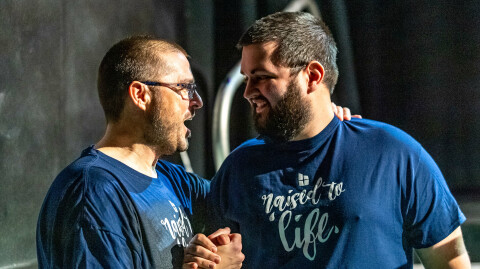As the Middle School Director, I get to walk alongside students and families who are going through a period of life where they experience the most change. And at the core of all this change is the tension of this question… is my child a big kid, or a little adult? I believe the answer is… YES!
I have plenty of anecdotal evidence to suggest both.
Ask any small group leader, and you will get plenty of stories of how immature a middle school student can be (big kid). But ask them again about a time when a middle school student surprised them; You may just get a few stories of how mature and thoughtful a middle school student can be (little adult).
A couple weeks ago I was reading an article in the Washingtonian called “What Happened After My 13-Year-Old Joined the Alt-Right Movement” and I was struck by the lesson this mom had to learn about where her middle school son was at in his development. Full disclosure, this story is clearly a unique and extreme situation. This exact situation isn’t likely to happen to your family. But there is still something to be learned from what this mother discovered about her son and what that might mean for other kids this age.
In this article, the author shares about how her son was drawn to the Alt-Right Movement.
This movement treated him and his opinions like he was an adult at a time when his parents didn’t. Now clearly, he wasn’t ready to be an actual adult. He still very much needed his parent’s guidance. But he was also old enough to know when he was being dismissed as a kid. His parents laughed at his opinions rather than engaging with him in the conversation. As a 13-year-old kid, he naturally gravitated to adults that treated him as one of them. Adults who didn’t laugh at him, and who encouraged his participation in their conversation. Because of that, he became a leader in the online Alt-Right Movement… at 13.
It is easy as parents to always see the “kid” in our kid. After all, until this point that is what they were. As they approach High School, they will be asked to interact with, form opinions about, and make decisions involving “adult topics.” As difficult as it can be if they don’t find the acceptance and respect of their opinions at home, they will gravitate to people and forums that do. That might be with friends, teachers, small group leaders, or even online strangers who have their own agendas and opinions.
So, what do we do?
Find ways to engage your middle school-aged kids in conversations that matter to them.
Listen to their thoughts and opinions. Use those conversations to guide and influence them not just towards what is good, but to what is biblical.
Be informed about what they care about.
With all the information out there and so easily accessible online, it is always easy to find information. If your kids can’t get that information from you, they will find it online. That isn’t necessarily a bad thing unless they don’t know how to filter through what they are reading for agendas and bias. You don’t need to be an expert, but you should know enough about what they care about to help them navigate the views.
Never give up.
In the article mentioned earlier, the mom spent a long time trying to bring her son back from where he was. She read everything she could, she argued with him, she punished him, moved him to a new school, and encouraged him to participate in more wholesome things. And it took a while, but she finally broke through to her son. She never gave up and was there for him when he was finally ready to accept that what he was involved in wasn’t good.
Middle School is full of transition, change, tension, and growth. As parents, there will be failures and victories. At times they will seem like a big kid, and others as little adults. And that is a good thing. Because it means intellectually they are ready to engage with life and faith on a new and deeper level, but still, need the guidance and wisdom of their parents.
This is where belief and faith take root, at the transition of big kid to little adult.



